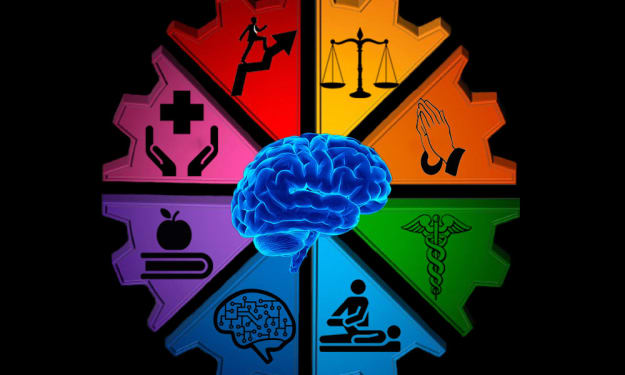Identity Development and Social Media
Social Psychology

Identity development, according to Yang, Holden, Carter, and Webb (2018) is an important developmental milestone for adolescents as well as emerging adults. Traditional frameworks for identity formation include friendships, family, classmates, peers, and colleagues as well as less personal relationships such as cultural norms, group membership, hobbies, and faith (Yang et al., 2018). Social identity formation can occur through various processes, with the most common being through social comparison. Social comparison theory, according to Fiske (2014), is when individuals compare themselves with other people, to assess their progress towards a perceived idea of success. Social comparison serves to help individuals understand how they are doing in a specific context (for instance, comparing themselves to a similar peer to see if they will succeed in a difficult task) and to help individuals via a self-enhancement process (e.g., comparing someone who is less well off financially to enhance your sense of self and make yourself feel better) (Fiske, 2014).
Throughout the past two decades, there has come a new platform that can affect the formation of an individual’s social identity that was birthed by the digital age: social media. Social media, such as Facebook, Twitter, Instagram, etc., all provide a new platform for social comparison in the modern digital age. These social media platforms, whether for good or bad, allow us to connect with friends, family, interest groups, culture-based groups, and even allow us to follow the lives of complete strangers. Despite what you may personally think of social media (whether those attitudes are positive or negative), social media and its effect on the formation of an individual’s social identity is a major social issue, especially for adolescents and emerging adults, when a personal or social identity can pave the way for future social interactions. The social issue at hand, then, is the effect that social media has on the formation of social identity through social comparison, as social media platforms are used to share life events, achievements, and opinions with very little physical interaction.
As stated before, social comparison is the process through which and individual compares themselves to others to bring about a self-enhancing or self-understanding effect (Fiske, 2014). However, the effects that social comparison have are not always positive ones. According to Fiske (2014), social comparison can lead to a self-destruction effect. Under the self-destruction outcome of social comparison, when comparing oneself to another a destructive behavior occurs (such as envy when comparing to people perceived as better than us, and dread when comparing to those perceived as lesser). Under the self-destruction effect, we dread becoming like those we see as lesser than us, and envy those who we think are better. In some situations, social comparison is an active behavior that we engage in to make ourselves feel better, and judge where in life we perceive ourselves to be (Fiske, 2014). However social comparison can occur on accident (Fiske, 2014). This is the root of the social problem stated before, the effects that social media have on identity formation through social comparison.
There has been a large amount of research on social comparison, social identity, and the formation of that social identity, with only some of that research examining the effects that social media has on social identity formation. For instance, Yang et al. (2018), citing various other studies, states that the nature of social comparison via social media is focused on the judgmental forms of comparison (such as likeability, attractiveness, etc.), and since these comparisons are related via a competitive nature, they result in negative psycho-emotional outcomes such as negative self-views and depression (de Vries & Kühne, 2015; Feinstein et al., 2013; Lim & Yang, 2015; Vogel et al., 2014; Weinstein, 2017; as cited in Yang et al., 2018).
The results of Yang et al.’s (2018) study reveal a very interesting correlation. Using a dual-path model on social comparison and introspective process (comparing ability using rumination and opinion using reflection), it was found that when comparing ability through a social introspective process, ability comparison positively correlated with rumination, which was a predictor of high identity distress. Social comparison through reflection was positively correlated with opinion-based social comparison, but not lower identity distress. The results showed that, despite the researchers’ best efforts to create a neutral measure of social comparison of ability, the findings still revealed a propensity for ability social comparisons to end with negative psycho-emotional outcomes (Yang et al., 2018).
When it comes to social comparison, one of the most vulnerable populations is any marginalized groups such as the LGBTQ community, especially LGBTQ adolescents (Ciszek, 2017). According to Ciszek (2017), LGBTQ youth find most of their information about sexuality (at least initially) through online sources and groups. Ciszek states that the online space the LGBTQ youth occupy is a strong force in the formation of social identity. However, due to the still non-normalized concept of LGTBQ youth, social comparisons with straight counterparts can be both positive and negative sources of social identity formation and can lead to either self-improvement or self-destruction (Ciszek, 2017).
A study conducted by Karahanna, Xu, Xu, and Zhang (2018) utilized a needs-affordances-features framework to examine social identity and self-identity in relation to social media (along with other things). According to this framework, social identity and self-identity are psychological needs that individuals must have (e.g., needs). Through social comparison processes, the need for a social identity is fulfilled (affordances such as browsing others’ profiles) (Karhanna, Xu, Xu, & Zhang, 2018).
Yang (2016) further defined the importance of the association between social comparison and social media use. The study examined the association between various types of social media use and loneliness, including social comparison orientation as a mediating factor. Social comparison orientation, or SCO, is a personality framework that is defined as the “tendency to compare one’s accomplishments, situation, and experiences with those of others” (Yang, 2016). Results of this study showed that actively interacting with others through social media is correlated with greater psychosocial wellbeing. However, the study results also found that individuals who scored higher on the SCO measure were more likely to engage in social comparison through social media, which according to the study results, resulted in negative feelings of envy and self-destruction (Yang, 2016). Yang (2016) concluded that social comparison can completely cancel out any positive effects of social media use.
Further research by Thomas, Briggs, Hart, & Kerrigan (2017) underline the importance of social media in both affirming existing online communities but also in establishing and assimilating into new ones. This study examined the transition of students into college atmospheres and the use of social media in forming and maintaining social identities (Thomas et al., 2017). Results showed that students utilize social media in different stages during their transition. First, they attempt to affirm their prior social identity (such as with friends and family). Next, they attempt adjustment and assimilation to their new identity (destination identity) through very rudimentary social comparisons with potential friends and classmates (Thomas et al., 2017). Third, was integration of the old and new identities and managing the challenges of each. Finally, was the social comparison stage itself. Students in their transition to college were flooded with the need to actively appear happy and prosperous in their social media posts, however, students regularly engaged in social comparison behaviors, comparing themselves with classmate’s and peer’s similar posts of happiness, causing negative psychosocial reactions (Thomas et al., 2017).
Although social media is becoming more common, research into the effects that social media have on identity through social comparison is relatively sparse. As such, there are several gaps in the literature that provide opportunity for future research directions. One gap in the current literature is whether different types of social media posts (word-based status updates, photos, GIF’s, videos, etc.) have different affects when viewed through a social comparison lens. Research by Yang (2016) examined the differences between type of media usage (active, passive, interactive) and their associations with social comparison and loneliness. However, little to no research exists on the potential effects that the type of posts viewed have on an individual’s self-worth or self-esteem, or the associations between the types of post viewed and an individual’s self-worth after social comparison occurs.
Another gap in the literature is the cultural differences that social media use and social comparison have on self-worth. Some research has been conducted on the associations between social media use, social comparison, self-worth, and social identities (Ciszek, 2017; Thomas, Briggs, Hart, & Kerrigan, 2017; Yang, 2016; Yang, Holden, Carter, and Webb, 2018) but very little research has examined the cross-cultural stability (or potential cultural variability) in the associations between social comparison within social media and social identity (self-improvement, self-destruction, etc.).
With these gaps in mind, using the social comparison orientation measure utilized in Yang (2016) and utilizing a multi-ethnic variable in correlational analyses, the research question that can be used in a future research study is: What variability of association (if any) exists between different cultural/ethnic groups and the tendency to engage in social comparison both within the individual’s ethnic/cultural ingroup and across ethnic/cultural lines. Utilizing an ethnic group identification measure by van Zomeren, Susilani, & Berend (2016) to gauge the strength of an individual participant’s ethnic group identification and examining the association between this score and participants’ responses on a survey measuring social comparison orientation, social media usage habits, and the tendency to compare themselves to others from same and different ethnic groups, the research question can be answered.
References
Ciszek, E. (2017). Advocacy Communication and Social Identity: An Exploration of Social Media Outreach. JOURNAL OF HOMOSEXUALITY, 64(14), 1993-2010. Doi: http://dx.doi.org/10.1080/00918369.2017.1293402
Fiske, S. T. (2014). Social beings: Core motives in social psychology. (3rd ed.). Hoboken, NJ: Wiley.
Karahanna, E., Xu S. X., Xu, Y., & Zhang, N. (2018). The Needs–Affordances–Features Perspective for The Use of Social Media, MIS Quarterly, 42(3), 737-756. Doi: 10.25300/MISQ/2018/11492
Thomas, L., Briggs, P., Hart, A., & Kerrigan, F. (2017). Understanding social media and identity work in young people transitioning to university. Computers in Human Behavior, 76, 541–553. https://doi-org.ezp.waldenulibrary.org/10.1016/j.chb.2017.08.021
Yang, C.-C. (2016). Instagram Use, Loneliness, and Social Comparison Orientation: Interact and Browse on Social Media, But Don’t Compare. Cyberpsychology, Behavior And Social Networking, 19(12), 703–708. Retrieved from https://search-ebscohost-com.ezp.waldenulibrary.org/login.aspx?direct=true&db=mnh&AN=27855266&site=eds-live&scope=site
Yang, C.-C., Holden, S. M., Carter, M. D. K., & Webb, J. J. (2018). Social media social comparison and identity distress at the college transition: A dual-path model. Journal of Adolescence 69, 92-102. Doi: https://doi.org/10.1016/j.adolescence.2018.09.007
van Zomeren, M., Susilani, N., & Berend, S. (2016). Ethnic Group Identification Measure. PsycTESTS. https://doi-org.ezp.waldenulibrary.org/Full; Full text; 999958516_full_001.pdf
About the Creator
Cobe Wilson
Gamer, writer, poet, academic.
Purchase photography or merchandise here!!! --> https://the-photography-of-cobe-wilson.creator-spring.com/






Comments
There are no comments for this story
Be the first to respond and start the conversation.